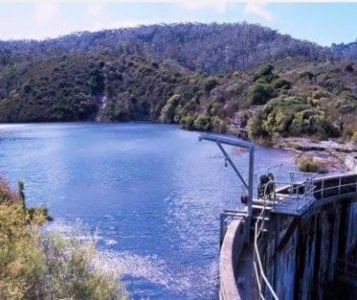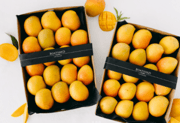Australian water source shuts down due to ‘forever chemicals’ threat
- Replies 12
Clean drinking water is essential for maintaining public health and well-being, as it prevents the spread of diseases and supports overall life quality.
Recently, a popular Australian water source has been temporarily closed as a precautionary measure following concerns over the presence of potentially harmful chemicals.
Authorities are taking action to ensure the safety and quality of the water supply, with investigations underway to assess the situation.
The discovery of ‘forever chemicals’ in a Blue Mountains dam has raised alarm bells for residents and officials alike, prompting WaterNSW to take swift action by shutting down the dam as a precautionary measure.
On Wednesday, August 28, the state water supplier and Greater Sydney’s catchment manager revealed that perfluorooctane sulfonate (PFOS) and perfluorooctanoic acid (PFOA) were found in Medlow Dam during an investigation.
‘The current investigation centres on the Blue Mountains area in the upper reaches of the Greater Sydney catchment where Sydney Water testing detected PFAS at levels below the Australian Drinking Water Guidelines in the Cascade water filtration plant supply,’ WaterNSW said in a statement.

It was reported that the water supply for 41,000 people was tainted with cancer-linked chemicals from a remote water source near Beauchamp Road in Medlow Bath.
‘Sydney Water has confirmed the water supplied from the Cascade water filtration plant to local communities is safe to consume and meets the Australian Drinking Water Guidelines,’ the statement continued.
‘Preliminary results, published on the WaterNSW website, indicate Medlow Dam is the only part of the Blue Mountains dam network returning elevated results.’
‘This dam does not supply raw water directly, but as a precautionary measure has been disconnected from supply while further investigations are conducted,’ they added.
Medlow Dam is one of five dams that supply the Cascade water filtration plant, which WaterNSW stated would undergo ‘ongoing, targeted investigation and monitoring’.
A previous report revealed that tap water in areas of Sydney, Newcastle, Canberra, Victoria, Queensland, and the ‘tourist havens’ of Rottnest and Norfolk contained these chemicals.
Experts emphasised the urgent need for widespread testing of Australia's drinking water after the US Environmental Protection Agency determined that there is no safe level of perfluorooctane sulfonate (PFOS) and perfluorooctanoic acid (PFOA), which are ‘likely’ to cause cancer.
In December, the World Health Organisation's cancer agency classified PFOA as carcinogenic to humans.
Dr Mariann Lloyd-Smith, a toxic chemicals advocate and former member of UN expert committees, called it a ‘national disgrace’ that these chemicals were allowed in Australia's tap water at levels 140 times higher than the US standard.
At the time, Dr Lloyd-Smith described the chemicals as ‘toxic’ and associated with ‘everything’, including cancer, low birth weight, and reproductive and developmental problems.
‘So, of course, you would be worried,’ she said.
‘And you would be looking to your governments and councils and your water providers to take action.’
However, Professor Denis O’Carroll from the University of New South Wales, who also serves as the Managing Director of the university’s Water Research Laboratory, explained that only prolonged, repeated exposure to these chemicals would lead to a gradual build-up over time.
He added that the levels found in Australia’s drinking water are well below those that would raise concern.
‘Just because Australia has a higher guideline doesn’t mean it’s at that guideline,’ Professor O’Carroll pointed out.
Meanwhile, Professor Stuart Khan from the University of Sydney expressed that he was ‘certainly worried’ about the presence of PFAS in Australian tap water.
‘While I don’t like it at all, I don’t believe we need to be alarmed about the presence of PFAS or other chemicals, which are currently below the safe levels described in the Australian Drinking Water Guidelines,’ he explained.
‘It is true that science is constantly evolving, and we are gradually gaining a better understanding of PFAS chemicals and their toxicity. And this is why the Australian Drinking Water Guidelines are constantly under review and being updated.’
‘The fact that the US EPA has established a newer, lower regulatory standard should not be a reason for the Australian Drinking Water Guidelines to automatically follow. Instead, it should trigger a review for a careful assessment of the case for revision,’ Professor Khan added.
 Have you had any concerns about the water you drink? How do you ensure that your water is safe?
Have you had any concerns about the water you drink? How do you ensure that your water is safe?
We invite you to share your thoughts and experiences regarding water safety and quality. Join the conversation below, and let's discuss the measures we can all take to safeguard our health.
Recently, a popular Australian water source has been temporarily closed as a precautionary measure following concerns over the presence of potentially harmful chemicals.
Authorities are taking action to ensure the safety and quality of the water supply, with investigations underway to assess the situation.
The discovery of ‘forever chemicals’ in a Blue Mountains dam has raised alarm bells for residents and officials alike, prompting WaterNSW to take swift action by shutting down the dam as a precautionary measure.
On Wednesday, August 28, the state water supplier and Greater Sydney’s catchment manager revealed that perfluorooctane sulfonate (PFOS) and perfluorooctanoic acid (PFOA) were found in Medlow Dam during an investigation.
‘The current investigation centres on the Blue Mountains area in the upper reaches of the Greater Sydney catchment where Sydney Water testing detected PFAS at levels below the Australian Drinking Water Guidelines in the Cascade water filtration plant supply,’ WaterNSW said in a statement.

WaterNSW has closed a Blue Mountains dam after detecting cancer-linked chemicals. Credit: Facebook / Medlow Bath Community
It was reported that the water supply for 41,000 people was tainted with cancer-linked chemicals from a remote water source near Beauchamp Road in Medlow Bath.
‘Sydney Water has confirmed the water supplied from the Cascade water filtration plant to local communities is safe to consume and meets the Australian Drinking Water Guidelines,’ the statement continued.
‘Preliminary results, published on the WaterNSW website, indicate Medlow Dam is the only part of the Blue Mountains dam network returning elevated results.’
‘This dam does not supply raw water directly, but as a precautionary measure has been disconnected from supply while further investigations are conducted,’ they added.
Medlow Dam is one of five dams that supply the Cascade water filtration plant, which WaterNSW stated would undergo ‘ongoing, targeted investigation and monitoring’.
A previous report revealed that tap water in areas of Sydney, Newcastle, Canberra, Victoria, Queensland, and the ‘tourist havens’ of Rottnest and Norfolk contained these chemicals.
Experts emphasised the urgent need for widespread testing of Australia's drinking water after the US Environmental Protection Agency determined that there is no safe level of perfluorooctane sulfonate (PFOS) and perfluorooctanoic acid (PFOA), which are ‘likely’ to cause cancer.
In December, the World Health Organisation's cancer agency classified PFOA as carcinogenic to humans.
Dr Mariann Lloyd-Smith, a toxic chemicals advocate and former member of UN expert committees, called it a ‘national disgrace’ that these chemicals were allowed in Australia's tap water at levels 140 times higher than the US standard.
At the time, Dr Lloyd-Smith described the chemicals as ‘toxic’ and associated with ‘everything’, including cancer, low birth weight, and reproductive and developmental problems.
‘So, of course, you would be worried,’ she said.
‘And you would be looking to your governments and councils and your water providers to take action.’
However, Professor Denis O’Carroll from the University of New South Wales, who also serves as the Managing Director of the university’s Water Research Laboratory, explained that only prolonged, repeated exposure to these chemicals would lead to a gradual build-up over time.
He added that the levels found in Australia’s drinking water are well below those that would raise concern.
‘Just because Australia has a higher guideline doesn’t mean it’s at that guideline,’ Professor O’Carroll pointed out.
Meanwhile, Professor Stuart Khan from the University of Sydney expressed that he was ‘certainly worried’ about the presence of PFAS in Australian tap water.
‘While I don’t like it at all, I don’t believe we need to be alarmed about the presence of PFAS or other chemicals, which are currently below the safe levels described in the Australian Drinking Water Guidelines,’ he explained.
‘It is true that science is constantly evolving, and we are gradually gaining a better understanding of PFAS chemicals and their toxicity. And this is why the Australian Drinking Water Guidelines are constantly under review and being updated.’
‘The fact that the US EPA has established a newer, lower regulatory standard should not be a reason for the Australian Drinking Water Guidelines to automatically follow. Instead, it should trigger a review for a careful assessment of the case for revision,’ Professor Khan added.
Key Takeaways
- WaterNSW has shut down a Blue Mountains dam as a precaution following the detection of PFOS and PFOA, chemicals linked to cancer.
- Over 40,000 people in the Greater Sydney catchment may have been exposed to these contaminants in their drinking water.
- Sydney Water assured that the water from the Cascade water filtration plant is safe and meets Australian Drinking Water Guidelines despite the contamination.
- There is ongoing investigation and monitoring, and experts call for widespread testing and a review of Australian guidelines in light of international findings on the toxicity of these chemicals.
We invite you to share your thoughts and experiences regarding water safety and quality. Join the conversation below, and let's discuss the measures we can all take to safeguard our health.







